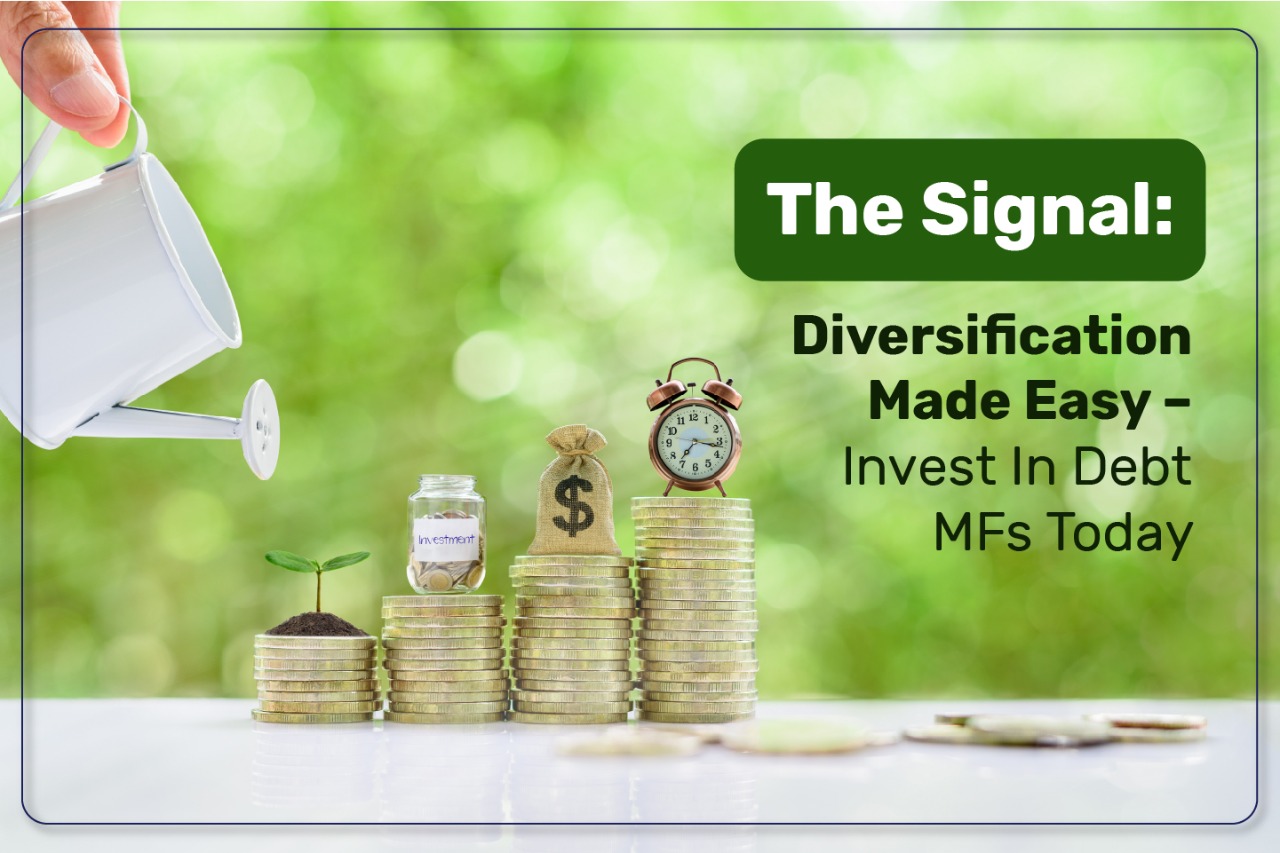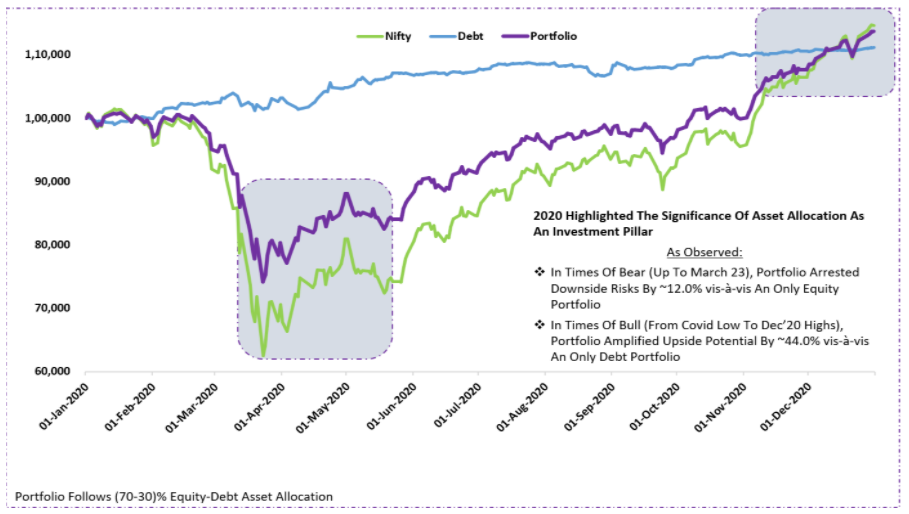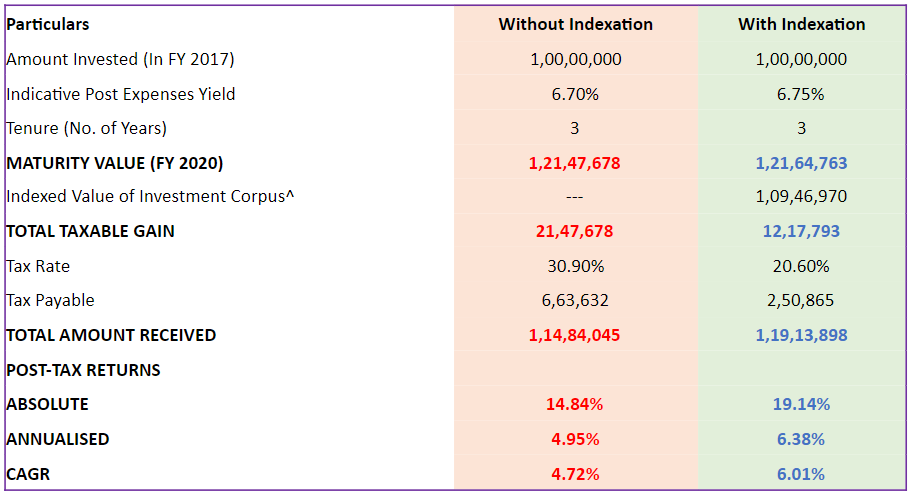
“You want to invest? Make sure to diversify your monies across asset classes” is a very common interaction in the investing world. Today’s note will deep-dive into phrase’s individual elements, so you too can design your portfolio in an efficient risk-return fashion.
Before we get into it, let us take a quick glance at understanding how portfolio diversification is helpful. In-line with pictures being worth 1000 words, view the graph below to merit diversification as a tool for minimizing risk and maximizing return:

As is observed above, a portfolio with healthy mix of 2 asset classes sees more controlled downside/upside comfort than single asset exposure funds.
The benefits of cross-asset investing are known by many, it is practiced by very few. The evidence lies in 45% vs 29% AUM growth in Equity vs Debt asset class respectively on FY21YTD basis. The record demat accounts opened in the year of pandemic further testify the affinity of a new investor to enter into markets with aims to materialize equity upside.
This approach carries its limitations as investors carry equity-skewed portfolios, compromising on risk appetite for return potential.
In attempting to curb such malpractices, it is recommended for all investors (sans vintage) to match fund risk to risk profile. This is most commonly done by diversifying into Debt funds. Hence, in anticipation of the same, let’s explore what the multiple facets of what debt funds are and more.
Remember, this learning today will help in earnings tomorrow.
- What Is Debt Investing? How Many Types Of Debt Mutual Funds Are There?
Debt investing involves taking exposure to fixed income instruments offering capital appreciation. Known for offering high liquidity, safety and stability, Debt funds are ideally suitable for investors with lower risk appetites. The funds enjoy tax benefits via indexation principle and also facilitate intelligent entry into equity markets via Systematic Transfer Plans (STPs).
Regulated by SEBI, there are many types of Debt funds following 2 broad practices in Accruals / Durations. The table below highlights the multiple types of Debt Mutual Funds:

Debt mutual funds, like their equity counterpart enjoy versatility in offerings, with each type serving a particular investment objective. It presents opportunities to bank on country’s micros and macros health to garner wealth across time horizons.
- What Are The 2 Main Strategies Followed By Debt MFs? What Is The Link Between (Investor) Suitability & Strategy?
As mentioned above, Debt MFs follow one of 2 key strategies in Accrual or Duration plays. A brief on the 2 are as follows:
1. Accrual Investing
Accrual funds adopt the Buy-&-Hold strategy, generally holding assets till maturity. The funds are tax-efficient in nature, designed to deliver traditional instrument beating returns. It is done by vouching for securities of varied risks from either Govt./Company, with risk being directly proportionate to return potential.
The funds are relatively more predictable in returns vis-à-vis equities, delivering the fund’s yield on maturity. Accrual strategy is not directly linked to country’s interest rate state, thereby making them safer than duration-oriented funds
2. Duration Investing
Duration funds try to capitalize on stage of the interest rate cycle by adjusting holding papers’ maturity. By principle, maturity is directly related to duration. Portfolio duration determines interest rate sensitivity as the 2 are directly correlated. Therefore, higher maturity -> higher duration -> high degree of interest rate sensitivity.
In knowing inverse correlation between price and yield, it is recommended for investors to opt for higher duration funds in times of rate reductions and vice-versa in times of rate increases. The quantum of duration a fund holds is determined by category regulations.
These funds are also tax-savvy offering indexation benefits and are suitable for investors willing to take a call on interest rate movements.
- What Is Indexation Benefit Offered By Debt Mutual Fund?
Indexation is an efficient way of reducing tax liability of your debt investments in the long-term (3+ years). It involves incorporating inflation into initial cost price, thus scaling up the price and reducing capital gains amount.
The illustration below highlights indexation in practice:

- What Are Key Risks Associated With Debt Mutual Funds?
Debt Mutual Funds, like every investment product, carries its own set of risks.
The 2 most common and broad-based risks are as follows:
1. Credit Risk
Credit risk is the chance that a bond issuer will not make the coupon payments or principal repayment to its bondholders. In other words, it is the chance the issuer will default. The capacity for failed payments is higher with funds taking exposure to higher quantum of poor rated papers.
More common in accrual strategies, credit risk MFs are most likeable to witness credit defaults.
2. Interest Rate Risk
Interest rate risk is the risk that arises for bond owners from fluctuating interest rates. How much interest rate risk a bond has depends on how sensitive its price is to interest rate changes in the market. Longer the duration of a fund, the more vulnerable it will be to interest rate movements.
Investor Takeaway
Every asset class has its “season”, serving its designated roles in alpha generation, limiting downside deviations, etc. As is seen through the note, sans-debt portfolios are subject to extreme volatilities in times of pain, thus eating into portfolio gains.
(P.S – We are still in the midst of biggest health crisis of this century)
The note elaborated on the philosophy of focusing on “learning before earning”.
As of now, you have learnt the basic elements of Debt investing. Its now time to earn!
With fisdom app, you can diversify your portfolio by buying into debt funds in less than 1 minute. Log on to the app now or reach out to us to know which debt fund will best fit your investment objectives and risk profiles.
As always, we eagerly await to hear from you. Till then, Happy Weekend.


























